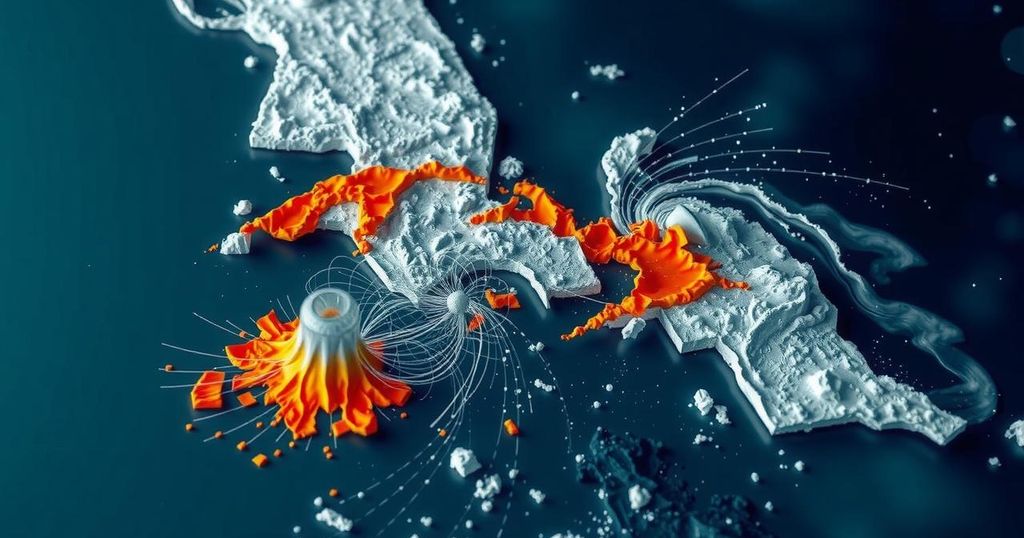An earthquake with a magnitude of 6.8 struck eastern Cuba on Sunday, following a series of hurricanes and blackouts. Tremors were felt in several cities, including Santiago de Cuba. Despite initial fears, there have been no reports of significant damage or injuries. The quake follows a particularly challenging period for the island, which has faced multiple natural disasters and ongoing power struggles.
On Sunday, eastern Cuba experienced a significant earthquake registering a preliminary magnitude of 6.8. This seismic event occurred following a troubling period characterized by hurricanes and widespread blackouts affecting the island’s population. The earthquake’s epicenter was situated approximately 25 miles south of Bartolome Maso, according to the United States Geological Survey. Tremors were felt across various regions, including major cities such as Santiago de Cuba, Holguín, and Guantanamo, with reports of tremors even reaching neighboring Jamaica. Fortunately, there have been no immediate confirmations of major damage or injuries within Cuba. Residents in Santiago, Cuba’s second-largest city, expressed their shock on Sunday. Yolanda Tabío, a 76-year-old local, recounted the aftermath, observing as people fled to the streets, nervously seeking safety in doorways. She noted experiencing at least two aftershocks, yet among her acquaintances, there were no reports of significant damages. “You had to see how everything was moving, the walls, everything,” she conveyed to The Associated Press. Other residents reported high levels of anxiety, citing intense screams during the quake, which they described as prolonged and powerful. In the small town of Pilón, individuals shared images on social media reflecting minor damages such as collapsed roofs and wall cracks, indicative of the aging infrastructure that is prevalent throughout Cuba. This earthquake follows a particularly challenging time for the island. Just three days prior, Hurricane Rafael, classified as a Category 3 storm, caused extensive damage in western Cuba. The hurricane’s ferocious winds led to island-wide power outages and the destruction of hundreds of homes. Survivors are still grappling with power restoration efforts, weeks after facing multiple natural disasters, including prolonged blackouts attributed to an ongoing energy crisis and the loss of lives due to earlier hurricanes. The series of crises has fueled public discontent, culminating in minor protests across various cities. The Cuban people, already overwhelmed by economic struggles, are facing additional challenges as they recover from these natural disasters.
The context surrounding this earthquake includes a series of recent severe weather events that have compounded issues for Cuba. The island has faced multiple hurricanes, notably Hurricane Rafael, which severely impacted infrastructure, leading to power outages and necessitating evacuations. These events occurred against the backdrop of an ongoing energy crisis that has left citizens without electricity for extended periods. Past hurricanes have also resulted in fatalities and widespread property damage, contributing to rising public dissatisfaction. As a result, the Cuban population has been increasingly burdened, struggling to navigate economic hardships while coping with the repercussions of these natural disasters, which have tested the resilience of both infrastructure and community morale.
In summary, the recent earthquake that struck eastern Cuba has added to the series of adversities faced by the island following hurricanes and blackouts. Although the immediate aftermath showed no significant injuries or widespread destruction, the psychological impact on the residents and minor damages reported in certain areas highlight the fragile state of Cuba’s infrastructure. Additionally, the historical context of recent weather-related calamities sheds light on the escalating challenges and discontent experienced by its populace. As the nation continues to recover from these events, the need for infrastructure improvements and effective disaster response plans remains critical.
Original Source: www.news5cleveland.com






